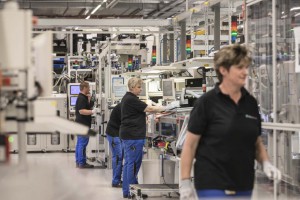
The smog that covers Beijing and other large cities in China now has regulators examining a plan to eliminate vehicles powered by internal combustion engines.
Faced with endemic smog problems in most of its major cities, China is ramping up pressure on the auto industry to switch to electric vehicles.
While it has raised the target for a new zero-emissions vehicle program, it has also cut automakers a little slack by postponing the start of the new program until 2019. Nonetheless, the industry now has to adapt to the idea of building more and more battery-based vehicles for the world’s largest car market — and Beijing regulators are strongly hinting they’re preparing to announce new rules that would phase out the internal combustion engine entirely.
Critics of the plans warn that Chinese consumers may not accept the shift to electrified vehicles and also argue that without finding an alternative for the coal fired generators that dominate in most parts of China, the new mandates may simply shift the source of pollution from the tailpipe to the smokestack.
But the threat of being locked out of the Chinese market, proponents note, already appears to be having a major impact on automotive planning. Since the beginning of the year, a growing number of manufacturers have announced plans to electrify their line-ups with hybrids, plug-ins and pure battery-electric vehicles. On Monday, General Motors, the second-largest automotive manufacturer in China, said it would launch 20 new BEVs by 2023, on its way to going completely battery-electric at some unspecified point in the near to mid-term future.

Daimler AG is partnering with BAIC to ramp up its electric vehicle production in China, which is pushing for more "new energy vehicles."
China’s auto industry has developed at an unprecedented rate, sales going from barely 1 million a year at the beginning of the millennium to more than 20 million in 2016. Some planners estimate demand could reach more than 30 million vehicles annually by the end of the coming decade.
But automobiles are catching blame for a major share of the country’s endemic air pollution, especially in major cities like Beijing and Shanghai. Local governments have already taken steps aimed at addressing the problem. More than a dozen cities now limit the number of new vehicles that can be registered each month, and vehicle pollution standards have gone from minimal to European level during the past decade.
Yet, few believe such steps can do more than slow the pace at which pollution worsens. That has led the Communist government in Beijing to take more radical action, starting with a planned phase-in of production quotas mandating the rollout of battery-electric vehicles.
The revised plan will require that 10% of every automaker’s production use pure electric propulsion in 2019 – up from an earlier mandate of 8%. The figure will grow to 12% in 2020 The government plans to continue ratcheting up the number each year but has not yet released the targets for 2021 and beyond.
In recent months, a number of global manufacturers – including Mercedes-Benz parent Daimler AG, Ford and Nissan – have announced new partnerships with local Chinese brands aimed at producing new lines of battery-electric vehicles.
(Daimler ties up to launch Chinese EV project. Click Herefor more.)

GM Chairman and CEO Mary Barra said consumers in China will need government enticements to buy EVs in the numbers it wants.
China is now the world’s largest market for electrified vehicles – including hybrids and more advanced, plug-based models – sales jumping 50% last year to 336,000, or more than double the roughly 160,000 such vehicles sold in the U.S. Nonetheless, that is still well short of what the new mandate would require in its first year, and industry officials are skeptical they can come close to meeting the target without government help.
“While we are exploring all channels to boost NEV sales, building raw consumer acceptance of NEVs will depend on continued joint effort between the government and automakers,” General Motors CEO Mary Barra said last month.
(Click Here for more on Barra’s comments.)
The government has signaled it may take steps to ease the burden on the industry, especially foreign manufacturers, by lifting rules requiring international companies like GM and Daimler to partner with local Chinese companies when opening plants in the country. Those rules may be lifted on EV factories, according to comments from the Ministry of Commerce.
The one-year delay was clearly intended to help the auto industry prepare for the big jump in production and sales, but whether it will prove to be enough time is uncertain.
And automakers are still left waiting to find out whether – or, more likely, when – Chinese authorities will take the next step. They recently signaled that the country could ban entirely the sale of vehicles using any form of internal combustion power, including plug-in hybrids.
If China moves that way it would follow Norway and India. Other countries, including the UK, France and Germany are now considering similar bans.
(Will China ban the internal combustion engine? Click Here to find out.)

The Chi-Coms are one-upping the Cal-Coms.
Their pollution is far worse.